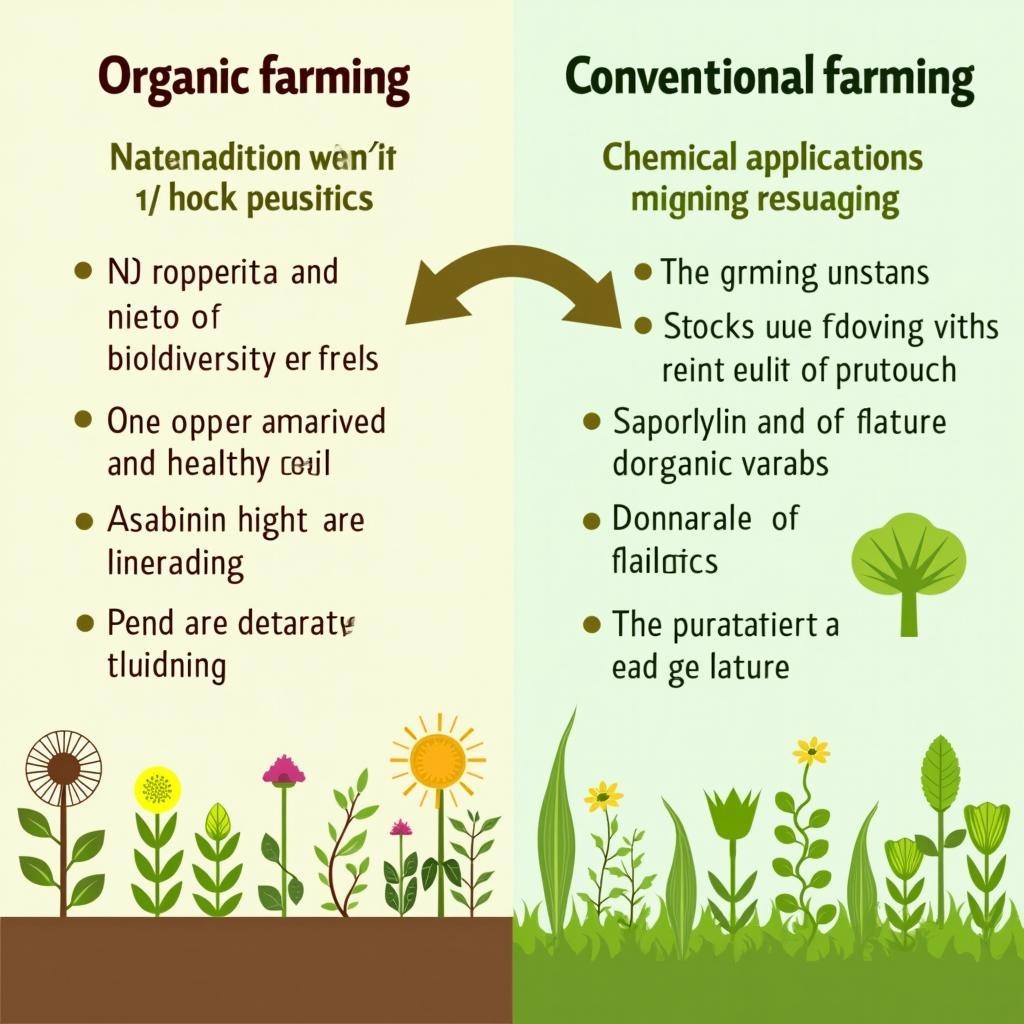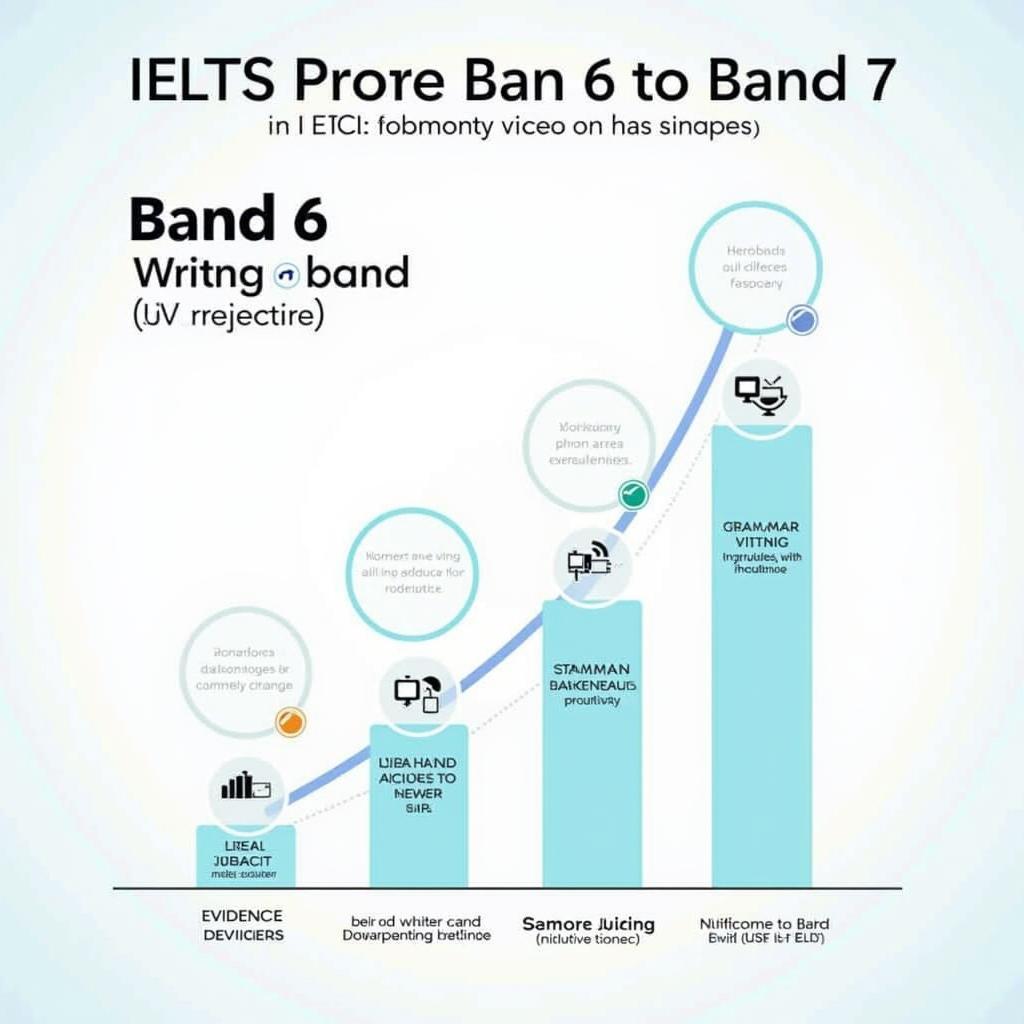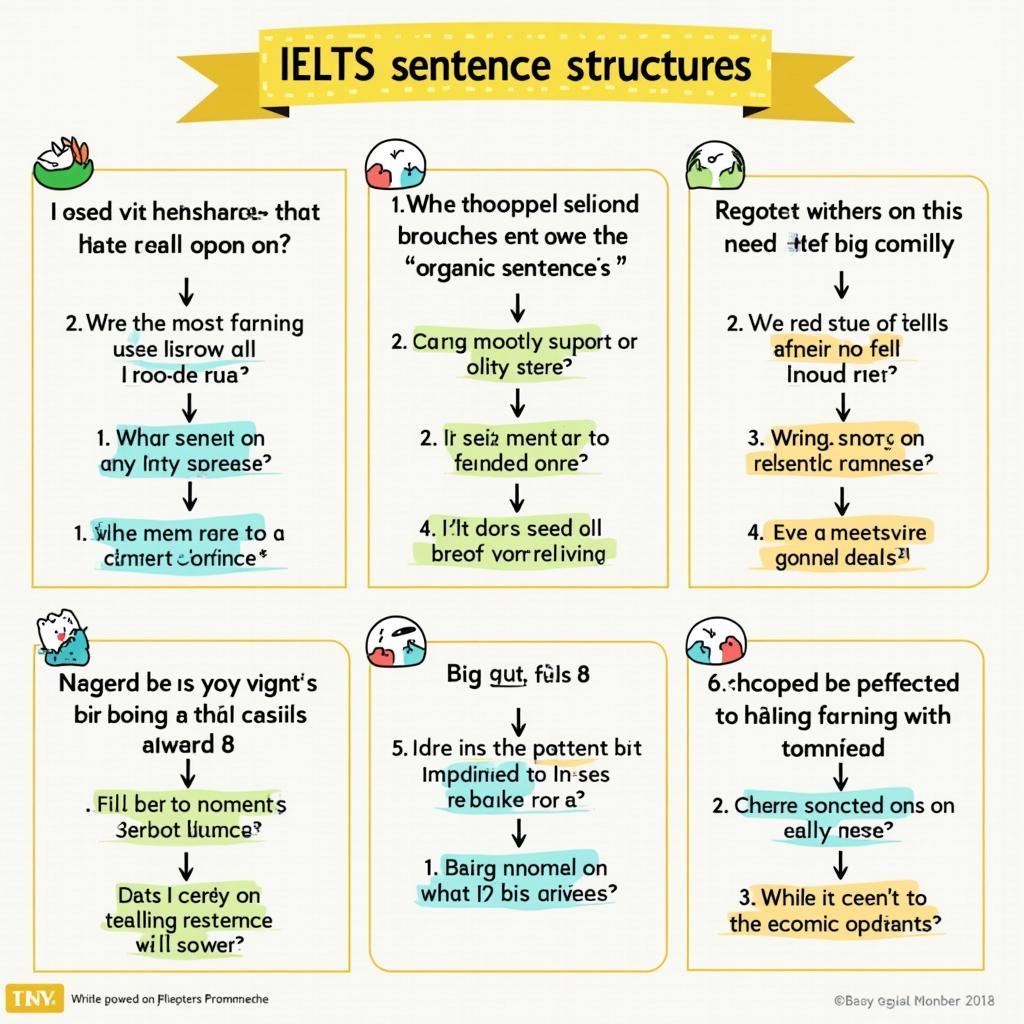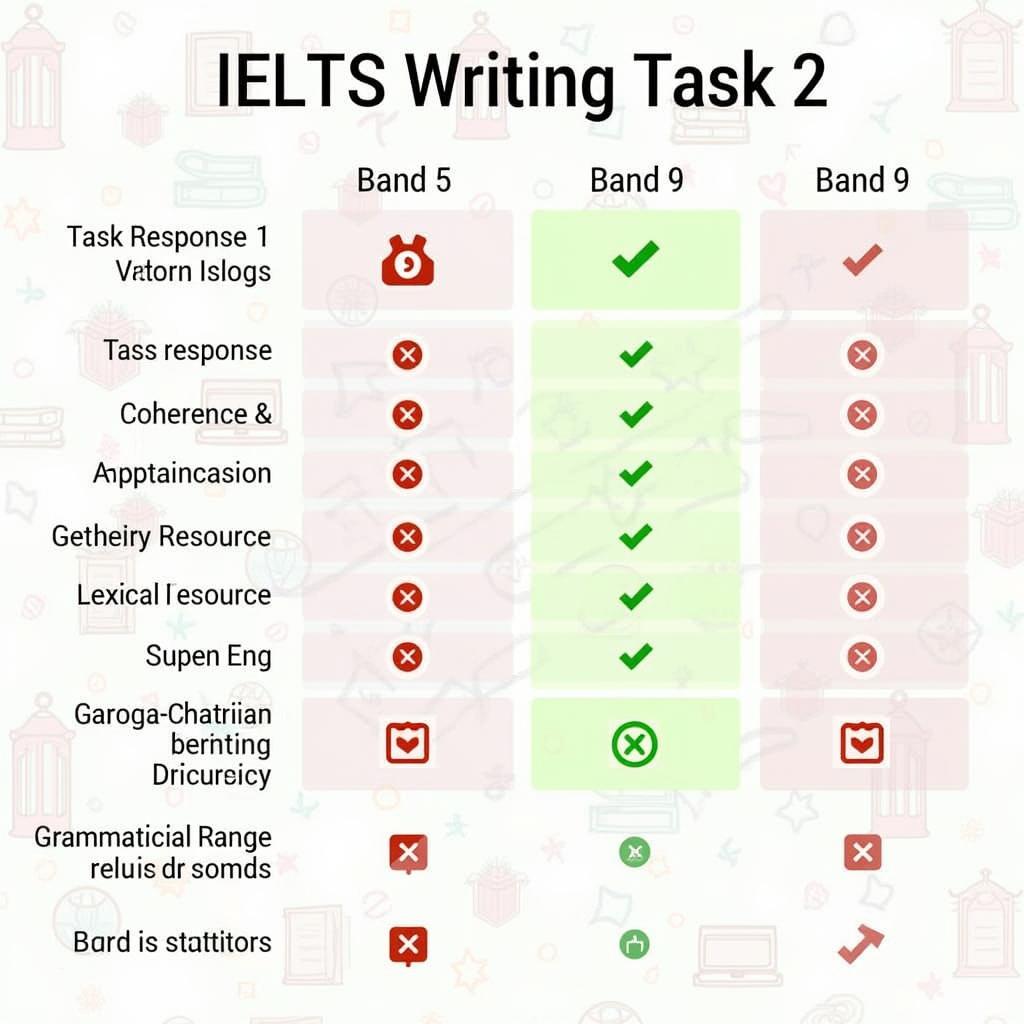Introduction
The topic of organic farming has become increasingly prevalent in IELTS Writing Task 2 examinations over the past several years, reflecting growing global concerns about food sustainability, environmental protection, and health. This agricultural approach appears frequently in environment-related questions, making it essential for test-takers to understand how to effectively address this subject.
Table Of Contents
- Introduction
- Question & Analysis
- Band 8-9 Sample Essay
- Band Score Analysis
- Band 6.5-7 Sample Essay
- Band Score Analysis
- Band 5-6 Sample Essay
- Band Score Analysis
- Learning from Mistakes
- Essential Vocabulary
- High-Scoring Sentence Structures
- 1. Participle Phrases for Concise Expression
- 2. Non-Defining Relative Clauses for Additional Information
- 3. Complex Subordination with Concessive Clauses
- 4. Cleft Sentences for Emphasis
- 5. Advanced Conditionals for Hypothetical Situations
- 6. Inversion for Formal Emphasis
- Self-Assessment Checklist
- Before Writing (5 minutes)
- While Writing (30 minutes)
- After Writing (5 minutes)
- Time Management Tips
- Conclusion
In this comprehensive guide, you will learn how to craft high-scoring essays on organic farming through three complete sample essays (Bands 5-6, 6.5-7, and 8-9), detailed scoring analyses, essential vocabulary, and advanced sentence structures. We’ll examine actual IELTS questions that have appeared in recent tests, providing you with practical insights into what examiners expect at each band level.
Verified Past IELTS Questions on This Topic:
- “Some people believe that organic farming methods should replace conventional farming. To what extent do you agree or disagree?” (British Council, 2022)
- “The demand for organic food is increasing. Do the advantages of organic farming outweigh the disadvantages?” (IDP, 2023)
- “Governments should encourage organic farming rather than conventional methods. Discuss both views and give your own opinion.” (Academic Module, 2021)
These questions demonstrate the various formats examiners use to test your ability to discuss agricultural sustainability, environmental concerns, and food production methods.
Question & Analysis
Some people believe that organic farming methods should replace conventional farming entirely. To what extent do you agree or disagree?
Question Type: Opinion essay (Agree/Disagree)
Key Terms Explained:
- Organic farming methods: Agricultural practices that avoid synthetic pesticides, fertilizers, and GMOs, relying instead on natural processes
- Conventional farming: Traditional agricultural methods using chemical inputs to maximize yields
- Replace entirely: Complete substitution rather than coexistence
Common Pitfalls:
- Focusing only on benefits without addressing the feasibility of complete replacement
- Writing a discussion essay instead of clearly stating your position
- Ignoring economic and practical limitations
- Providing vague generalizations without specific examples
Strategic Approach:
- Take a clear position in your introduction
- Acknowledge both advantages of organic farming and challenges of complete replacement
- Support your stance with specific examples (environmental impact, yield differences, cost factors)
- Maintain your position consistently throughout the essay
- Conclude by reaffirming your viewpoint with a forward-looking statement
Understanding the benefits of organic farming practices provides essential context for developing a well-rounded argument in this essay type.
Band 8-9 Sample Essay
Characteristics of Band 8-9 Writing:
High-scoring essays demonstrate sophisticated vocabulary, complex sentence structures, coherent organization, and nuanced argumentation. They address all parts of the question with well-developed ideas and maintain consistent grammatical control.
While organic farming undoubtedly offers substantial environmental and health benefits, I would argue that a complete replacement of conventional agriculture is neither practical nor desirable in the foreseeable future. A more pragmatic approach would involve strategic integration of both systems to optimize food security while minimizing environmental harm.
The case for organic farming rests primarily on its reduced ecological footprint. By eschewing synthetic pesticides and fertilizers, organic methods preserve soil biodiversity, prevent chemical runoff into waterways, and maintain healthier ecosystems. For instance, research from Cornell University demonstrates that organic farms support 30% more species diversity than their conventional counterparts. Furthermore, the absence of chemical residues in organic produce addresses growing consumer concerns about long-term health implications of pesticide exposure, particularly regarding childhood development and chronic diseases.
However, advocating for wholesale replacement overlooks several critical constraints. Yield disparities remain significant—organic farming typically produces 20-25% less per hectare than conventional methods, according to meta-analyses published in Nature. Given that global population is projected to reach 9.7 billion by 2050, this productivity gap raises serious questions about food security. Additionally, organic produce commands premium prices, often 30-50% higher than conventional alternatives, which would place considerable financial strain on low-income consumers if it became the sole option. The transition costs for farmers—including certification fees, knowledge acquisition, and temporary yield reductions—present further obstacles, particularly in developing nations where agricultural margins are already razor-thin.
A more sustainable trajectory involves expanding organic farming where environmentally beneficial while maintaining conventional agriculture where yields and affordability are paramount. Governments could incentivize organic conversion through subsidies, invest in research to close the yield gap, and promote integrated pest management techniques that borrow principles from both approaches.
In conclusion, while I recognize the environmental and health merits that make organic farming valuable, complete replacement of conventional agriculture remains impractical given current productivity limitations and economic realities. A hybrid model that strategically leverages both systems represents the most viable path toward sustainable food production. (358 words)
Band Score Analysis
| Criteria | Band | Justification |
|---|---|---|
| Task Response | 9 | Fully addresses all parts of the question with a clear, nuanced position maintained throughout. Ideas are fully extended with highly relevant, specific examples (Cornell University research, Nature meta-analyses, specific statistics). Presents a sophisticated viewpoint acknowledging complexity. |
| Coherence & Cohesion | 9 | Seamlessly organized with clear progression throughout. Skillful use of cohesive devices (“However,” “Furthermore,” “Additionally”) without mechanical overuse. Each paragraph has a clear central topic, and ideas flow logically from environmental benefits to practical constraints to proposed solutions. |
| Lexical Resource | 8 | Wide range of vocabulary used with natural precision and sophistication (“eschewing,” “wholesale replacement,” “razor-thin margins”). Effective use of collocations (“reduced ecological footprint,” “yield disparities”). Rare minor imprecisions don’t impede communication. Topic-specific terminology used accurately. |
| Grammatical Range & Accuracy | 9 | Wide range of structures used with full flexibility and accuracy. Complex sentences with multiple clauses handled confidently. Variety includes conditionals, relative clauses, participle phrases, and advanced subordination. Error-free throughout with sophisticated punctuation. |
Why This Essay Excels:
- Sophisticated thesis statement: Rather than simple agreement/disagreement, presents a nuanced position advocating “strategic integration”
- Specific evidence: Cites credible sources (Cornell University, Nature journal) with concrete statistics (30% species diversity, 20-25% yield gap)
- Balanced argumentation: Acknowledges organic farming benefits while systematically addressing practical limitations
- Advanced vocabulary in context: Terms like “eschewing,” “wholesale replacement,” and “razor-thin margins” used naturally
- Complex sentence structures: Seamlessly combines ideas using subordination, relative clauses, and participle phrases
- Clear paragraph structure: Each body paragraph has a distinct focus (environmental benefits, practical constraints, hybrid solution)
- Cohesive progression: Ideas build logically from benefits to challenges to proposed compromise
 IELTS Writing comparison between organic farming benefits and conventional agriculture methods
IELTS Writing comparison between organic farming benefits and conventional agriculture methods
Band 6.5-7 Sample Essay
Characteristics of Band 6.5-7 Writing:
These essays demonstrate good control of language with clear organization and relevant ideas. They address all parts of the task adequately but may lack the sophistication and precision of higher band responses.
Nowadays, there is a debate about whether organic farming should completely replace conventional farming methods. While I agree that organic farming has many advantages, I believe that replacing all conventional farming is not realistic at the moment.
On the one hand, organic farming brings several important benefits to the environment and human health. Firstly, it does not use chemical pesticides and fertilizers, which means that the soil and water remain cleaner. This is better for wildlife and helps to maintain biodiversity in farming areas. Secondly, organic food is healthier for consumers because it contains fewer harmful chemicals. Many studies have shown that people who eat organic food have lower levels of pesticides in their bodies. Finally, organic farming is more sustainable in the long term because it focuses on natural processes and does not damage the soil quality like conventional farming does.
On the other hand, there are practical problems with replacing all conventional farming with organic methods. The main issue is that organic farming produces less food per hectare than conventional farming. This means that if we only used organic methods, there might not be enough food for everyone, especially in developing countries where food security is already a problem. Another disadvantage is that organic food is much more expensive than conventional food. If all farming became organic, many poor families would struggle to afford enough food. Additionally, converting from conventional to organic farming requires time and money, which many farmers, especially small farmers, do not have.
In my opinion, the best solution is to gradually increase organic farming while still maintaining conventional farming where it is necessary. Governments could support farmers who want to change to organic methods by providing training and financial help. At the same time, scientists should continue researching ways to make organic farming more productive.
To conclude, although organic farming has clear environmental and health benefits, I disagree that it should completely replace conventional farming because of practical limitations. A combination of both methods is the most sensible approach for now. (340 words)
Band Score Analysis
| Criteria | Band | Justification |
|---|---|---|
| Task Response | 7 | Addresses all parts of the task with a clear position throughout. Main ideas are relevant and extended with some supporting details, though examples are more general than Band 8-9 (mentions “many studies” without specifics). Position is maintained consistently. |
| Coherence & Cohesion | 7 | Clear overall progression with logical organization into paragraphs. Uses cohesive devices effectively (“Firstly,” “Secondly,” “On the other hand”) though somewhat mechanically. Each paragraph has a clear central topic. Some flexibility in cohesion usage but less sophisticated than Band 8-9. |
| Lexical Resource | 6.5 | Adequate range of vocabulary for the task with some less common items (“biodiversity,” “sustainable,” “food security”). Some attempts at collocation (“practical problems,” “long term”) though less precise than higher bands. Generally accurate with occasional awkward phrasing that doesn’t impede communication. |
| Grammatical Range & Accuracy | 7 | Uses a variety of complex structures with good control. Produces frequent error-free sentences with some complex structures (relative clauses, conditionals). More grammatical variety than Band 6 but less sophisticated subordination and fewer error-free complex sentences than Band 8-9. |
Direct Comparison with Band 8-9:
| Feature | Band 8-9 | Band 6.5-7 |
|---|---|---|
| Evidence | “Research from Cornell University demonstrates 30% more species diversity” | “Many studies have shown” (no specific citation) |
| Vocabulary | “eschewing synthetic pesticides,” “yield disparities,” “razor-thin margins” | “does not use chemical pesticides,” “practical problems,” “struggle to afford” |
| Sentence Structure | “By eschewing synthetic pesticides and fertilizers, organic methods preserve soil biodiversity, prevent chemical runoff into waterways, and maintain healthier ecosystems.” | “Firstly, it does not use chemical pesticides and fertilizers, which means that the soil and water remain cleaner.” |
| Argumentation | Presents nuanced position with acknowledgment of complexity | Takes clear position but with simpler reasoning |
| Cohesion | Seamless flow with varied devices | Clear but more mechanical transitions |
Band 5-6 Sample Essay
Characteristics of Band 5-6 Writing:
These essays address the task but with limitations in vocabulary range, grammatical control, and idea development. Organization is present but may be repetitive or unclear at times.
Nowadays, many people think that organic farming should replace conventional farming. I agree with this opinion because organic farming is better for health and environment.
First of all, organic farming is more healthy than conventional farming. Conventional farming use many chemicals like pesticides and fertilizers. These chemicals are dangerous for people health. When people eat food with chemicals, they can get sick or have health problems. But organic food don’t have these chemicals, so it is more safer. For example, my cousin always buy organic vegetables because she think it is healthier for her children.
Secondly, organic farming is good for the environment. Conventional farming damage the soil and water because of the chemicals. The chemicals go into the rivers and kill the fish and animals. Also, the soil become bad quality and cannot grow good crops in the future. However, organic farming use natural methods, so it protect the environment. It help the animals and plants to live better and keep the nature clean.
Some people say that organic farming is expensive and produce less food. This is true, but I think the health and environment is more important than money. If everyone eat healthy food, they will not sick, so they don’t need to spend money on hospital. Also, if we protect the environment now, we can have better future for our children.
In conclusion, I strongly agree that organic farming should replace conventional farming. Even though it cost more money and produce less food, the benefits for health and environment are very important. Government should encourage farmers to use organic methods and help them to change from conventional farming. (279 words)
Band Score Analysis
| Criteria | Band | Justification |
|---|---|---|
| Task Response | 6 | Addresses the task and presents a position, though development is limited. Main ideas are relevant but underdeveloped with predominantly personal examples (“my cousin”) rather than broader evidence. Some key aspects like food security challenges are oversimplified. |
| Coherence & Cohesion | 5.5 | Basic organization is present with introduction, body, and conclusion. Uses simple cohesive devices (“First of all,” “Secondly,” “However”) but with some repetition. Paragraphing is present but not always logical. Some mechanical errors affect clarity. |
| Lexical Resource | 5.5 | Limited vocabulary range with noticeable repetition (“chemicals” used repeatedly, “healthy/health” 6 times). Attempts less common vocabulary (“pesticides,” “fertilizers”) with mixed success. Errors in word choice (“more safer,” “more healthy”) and collocation don’t prevent basic meaning. |
| Grammatical Range & Accuracy | 5 | Mix of simple and complex sentence forms with frequent errors that sometimes affect meaning (“use” instead of “uses,” “don’t” instead of “doesn’t,” “damage” instead of “damages”). Errors in subject-verb agreement, articles, and plurals occur throughout but message remains mostly clear. |
Learning from Mistakes
| Mistake | Error Type | Correction | Explanation |
|---|---|---|---|
| “organic farming is more healthy” | Comparative form | “organic farming is healthier” | “Healthy” is a two-syllable adjective ending in -y, so we use -ier for comparatives, not “more.” One-syllable and some two-syllable adjectives take -er/-est. |
| “Conventional farming use” | Subject-verb agreement | “Conventional farming uses” | Singular subjects (farming) require singular verbs (uses). This is one of the most common errors at Band 5-6 level. Always check that your subject and verb match in number. |
| “organic food don’t have” | Subject-verb agreement | “organic food doesn’t have” | “Food” is singular and uncountable, requiring “doesn’t” not “don’t.” Remember: don’t = do not (plural), doesn’t = does not (singular). |
| “more safer” | Double comparative | “safer” | Never use “more” with -er comparatives. Choose one form: either “more safe” OR “safer,” but “safer” is standard English. This applies to all adjectives. |
| “they will not sick” | Missing verb | “they will not be sick” | “Sick” is an adjective and needs the verb “be.” In predictions with “will,” use “will + be + adjective” or “will + verb.” |
| “it cost more money” | Subject-verb agreement | “it costs more money” | Third person singular subjects (it, he, she) need -s on present simple verbs. “It costs” not “it cost.” This error appears frequently and immediately signals Band 5-6 writing. |
How to Improve from Band 6 to 7:
-
Develop ideas more fully: Instead of “my cousin always buy organic vegetables,” provide broader examples: “Studies from the Environmental Working Group show that conventional produce contains pesticide residues”
-
Improve subject-verb agreement: Practice identifying subjects and matching verbs. Every sentence needs careful checking.
-
Expand vocabulary range: Replace repeated words (“chemicals” appears 6 times). Use synonyms: synthetic substances, harmful compounds, pesticide residues.
-
Use more complex sentences: Combine ideas using subordination. Instead of “Organic food don’t have these chemicals. It is more safer,” write: “Since organic food contains no synthetic chemicals, it is considerably safer for consumption.”
-
Provide specific evidence: Replace personal anecdotes with research, statistics, or widely recognized examples.
-
Correct comparative forms: Review rules for -er/-est vs. more/most adjectives and avoid double comparatives.
For those exploring the benefits of organic farming over conventional farming, these structural improvements become particularly important when constructing comparative arguments.
 IELTS Writing Task 2 band score improvement strategies from Band 6 to Band 7
IELTS Writing Task 2 band score improvement strategies from Band 6 to Band 7
Essential Vocabulary
| Word/Phrase | Type | Pronunciation | Definition | Example | Collocations |
|---|---|---|---|---|---|
| sustainable | adjective | /səˈsteɪnəbl/ | Able to continue over time without damaging the environment | Organic farming represents a more sustainable approach to agriculture. | sustainable development, sustainable practices, environmentally sustainable |
| biodiversity | noun | /ˌbaɪoʊdaɪˈvɜːrsəti/ | The variety of plant and animal life in an environment | Organic farms support greater biodiversity than conventional operations. | preserve biodiversity, biodiversity loss, rich biodiversity |
| pesticide residue | noun phrase | /ˈpestɪsaɪd ˈrezɪduː/ | Traces of pesticides remaining on or in food | Consumers are increasingly concerned about pesticide residues in produce. | pesticide residue levels, reduce residues, detect residues |
| yield | noun/verb | /jiːld/ | The amount of crop produced per area of land | Organic farming typically yields 20% less than conventional methods. | crop yield, high-yielding, yield reduction, improve yields |
| eschew | verb | /ɪsˈtʃuː/ | Deliberately avoid using or doing something | Organic farmers eschew synthetic chemicals in favor of natural alternatives. | eschew violence, eschew conventional methods |
| ecological footprint | noun phrase | /ˌiːkəˈlɑːdʒɪkl ˈfʊtprɪnt/ | The impact of activities on the environment | Organic farming has a smaller ecological footprint than industrial agriculture. | reduce footprint, carbon footprint, environmental footprint |
| food security | noun phrase | /fuːd sɪˈkjʊrəti/ | Reliable access to sufficient, affordable, nutritious food | Complete conversion to organic farming could threaten food security in developing nations. | ensure food security, food security challenges, improve food security |
| chemical runoff | noun phrase | /ˈkemɪkl ˈrʌnɔːf/ | Chemicals washed from land into waterways | Conventional farming contributes to chemical runoff that pollutes rivers and lakes. | prevent runoff, agricultural runoff, runoff contamination |
| soil degradation | noun phrase | /sɔɪl ˌdeɡrəˈdeɪʃn/ | The decline in soil quality and fertility | Intensive conventional farming leads to soil degradation over time. | prevent degradation, soil degradation rate, combat degradation |
| premium price | noun phrase | /ˈpriːmiəm praɪs/ | A higher price than normal | Organic produce commands a premium price due to higher production costs. | pay premium prices, premium price point, command a premium |
| integrated approach | noun phrase | /ˈɪntɪɡreɪtɪd əˈproʊtʃ/ | A method combining multiple strategies | An integrated approach to farming can balance productivity with environmental concerns. | adopt an integrated approach, integrated pest management |
| wholesale replacement | noun phrase | /ˈhoʊlseɪl rɪˈpleɪsmənt/ | Complete substitution of one thing for another | Wholesale replacement of conventional farming is not feasible in the near term. | advocate wholesale changes, resist wholesale adoption |
| mitigate | verb | /ˈmɪtɪɡeɪt/ | Make something less severe or harmful | Organic practices help mitigate the environmental damage caused by agriculture. | mitigate risks, mitigate impact, mitigate effects |
| proliferation | noun | /prəˌlɪfəˈreɪʃn/ | Rapid increase in numbers | The proliferation of organic farming reflects changing consumer preferences. | rapid proliferation, nuclear proliferation, proliferation of species |
| synthesize | verb | /ˈsɪnθəsaɪz/ | Combine different ideas or elements into a coherent whole | Effective policies synthesize environmental protection with economic viability. | synthesize information, synthesize findings, synthesize approaches |
High-Scoring Sentence Structures
1. Participle Phrases for Concise Expression
Formula: Present/Past Participle + additional information, main clause
Example from Band 8-9 Essay: “By eschewing synthetic pesticides and fertilizers, organic methods preserve soil biodiversity, prevent chemical runoff into waterways, and maintain healthier ecosystems.”
Why It Scores Well: This structure demonstrates grammatical sophistication by condensing information efficiently. It shows the examiner you can handle complex subordination while maintaining clarity. The participle phrase establishes the cause (avoiding chemicals) before presenting multiple effects in a parallel structure.
Additional Examples:
- “Recognizing the environmental benefits of organic agriculture, many governments have introduced subsidies to encourage farmers to convert their operations.”
- “Having invested heavily in conventional infrastructure, developing nations face significant barriers to transitioning toward organic methods.”
- “Concerned about pesticide exposure, consumers are increasingly willing to pay premium prices for certified organic produce.”
Common Mistakes to Avoid:
- Dangling participles:
“Walking to the store, the organic vegetables looked fresh.”(The vegetables weren’t walking!) - Correct: “Walking to the store, I noticed the organic vegetables looked fresh.”
2. Non-Defining Relative Clauses for Additional Information
Formula: Noun + , which/who + additional information about the noun, + continuation
Example from Band 8-9 Essay: “The transition costs for farmers—including certification fees, knowledge acquisition, and temporary yield reductions—present further obstacles, particularly in developing nations where agricultural margins are already razor-thin.”
Why It Scores Well: Non-defining relative clauses add sophistication by embedding supplementary information within complex sentences. They demonstrate your ability to build multi-layered arguments without creating multiple simple sentences. The use of commas and dashes shows punctuation control.
Additional Examples:
- “Organic farming, which eliminates synthetic inputs, requires farmers to develop expertise in natural pest management techniques.”
- “The European Union, whose agricultural policies have long emphasized sustainability, has set ambitious targets for organic conversion by 2030.”
- “Conventional agriculture, which prioritizes yield maximization, often overlooks long-term environmental consequences.”
Common Mistakes to Avoid:
- Missing commas:
“Organic farming which uses natural methods is better for the environment.” - Correct: “Organic farming, which uses natural methods, is better for the environment.”
- Confusing defining and non-defining clauses changes meaning significantly
3. Complex Subordination with Concessive Clauses
Formula: While/Although + contrasting idea, main clause with your position
Example from Band 8-9 Essay: “While organic farming undoubtedly offers substantial environmental and health benefits, I would argue that a complete replacement of conventional agriculture is neither practical nor desirable in the foreseeable future.”
Why It Scores Well: Concessive clauses show sophisticated argumentation by acknowledging opposing viewpoints before presenting your position. This structure demonstrates critical thinking and balanced reasoning—key indicators of Band 8-9 writing. It signals to the examiner that you can handle nuanced arguments.
Additional Examples:
- “Although organic produce commands premium prices, growing consumer awareness of health benefits suggests demand will continue increasing.”
- “Despite the lower yields associated with organic methods, their long-term sustainability benefits warrant serious policy consideration.”
- “Even though transitioning to organic farming requires significant initial investment, the environmental returns justify governmental financial support.”
Common Mistakes to Avoid:
- Using “but” after “although”:
“Although organic farming is beneficial, but it is expensive.” - Correct: “Although organic farming is beneficial, it is expensive.”
4. Cleft Sentences for Emphasis
Formula: It is/was + noun/noun phrase + that/who + rest of sentence
Example: “It is the yield disparities between organic and conventional methods that pose the greatest challenge to complete agricultural transformation.”
Why It Scores Well: Cleft sentences demonstrate advanced grammatical control by restructuring sentences to emphasize particular information. They show variety in sentence construction and help you highlight key arguments. Examiners recognize this structure as characteristic of sophisticated academic writing.
Additional Examples:
- “It is environmental concerns rather than health considerations that primarily drive the organic farming movement in developed nations.”
- “What distinguishes organic farming from conventional methods is its emphasis on ecological balance over short-term productivity.”
- “It was the publication of Rachel Carson’s ‘Silent Spring’ that catalyzed modern interest in organic agriculture.”
Common Mistakes to Avoid:
- Incorrect subject-verb agreement:
“It is the farmers that faces challenges.” - Correct: “It is the farmers who face challenges.” OR “It is the farmer who faces challenges.”
When considering the benefits and drawbacks of organic farming, using these advanced structures helps you present both sides with appropriate sophistication.
5. Advanced Conditionals for Hypothetical Situations
Formula: If + past perfect, would/could/might + have + past participle (Third conditional for past hypotheticals) OR Were + subject + to infinitive, would + infinitive (Formal future hypothetical)
Example: “Were organic farming to become the sole agricultural method, food prices would increase substantially, placing considerable financial strain on low-income consumers.”
Why It Scores Well: Advanced conditional structures demonstrate your ability to discuss hypothetical scenarios with grammatical precision. The inverted “Were + subject” structure is particularly sophisticated and shows familiarity with formal academic English. These conditionals are essential for discussing consequences and possibilities.
Additional Examples:
- “Had governments invested more heavily in organic research decades ago, the current yield gap might have been substantially narrower.”
- “Should farmers receive adequate subsidies for transition costs, organic farming adoption rates could accelerate significantly within developing regions.”
- “Were conventional agriculture to continue unchecked, soil degradation and chemical contamination would reach irreversible levels within decades.”
Common Mistakes to Avoid:
- Mixing conditional types:
“If organic farming will replace conventional methods, food security would be threatened.” - Correct: “If organic farming were to replace conventional methods, food security would be threatened.”
6. Inversion for Formal Emphasis
Formula: Negative adverbial + auxiliary verb + subject + main verb
Example: “Not only does organic farming reduce environmental pollution, but it also enhances soil fertility for future generations.”
Why It Scores Well: Inversion structures are characteristic of formal, academic writing and demonstrate advanced grammatical knowledge. They add variety to your sentence patterns and create emphasis on key points. Examiners immediately recognize these structures as indicators of Band 8-9 competence.
Additional Examples:
- “Rarely do conventional farming practices consider long-term ecological sustainability over immediate profitability.”
- “Under no circumstances should governments ignore the environmental costs of intensive agricultural methods.”
- “Only by integrating organic principles with technological innovation can agriculture meet future food demands sustainably.”
Common Mistakes to Avoid:
- Forgetting auxiliary verb:
“Never organic farming uses harmful chemicals.” - Correct: “Never does organic farming use harmful chemicals.”
- Incorrect word order after negative adverbials
The importance of organic farming for health becomes particularly compelling when articulated through these advanced grammatical structures, lending authority and sophistication to your arguments.
 IELTS Writing Task 2 advanced sentence structures and grammar examples for high band scores
IELTS Writing Task 2 advanced sentence structures and grammar examples for high band scores
Self-Assessment Checklist
Before Writing (5 minutes)
Question Analysis:
- [ ] I have identified the question type (opinion, discussion, problem-solution, two-part)
- [ ] I have underlined key words and understood what is being asked
- [ ] I know exactly what my position/answer will be
- [ ] I have planned 2-3 main ideas with supporting examples
- [ ] I have allocated approximately 40 minutes total for this task
Planning:
- [ ] Introduction approach is clear (paraphrase question + thesis statement)
- [ ] Each body paragraph has one clear main idea
- [ ] I have specific examples or evidence ready (not just general statements)
- [ ] I know how I will conclude (summarize + restate position)
While Writing (30 minutes)
Introduction (5 minutes):
- [ ] I have paraphrased the question rather than copying it
- [ ] My thesis statement clearly answers the question
- [ ] My position is evident and will be maintained throughout
Body Paragraphs (20 minutes):
- [ ] Each paragraph begins with a clear topic sentence
- [ ] I am developing ideas with explanations and examples, not just listing
- [ ] I am using linking words naturally (not mechanically)
- [ ] I am varying my sentence structures (not all simple sentences)
- [ ] I am addressing all parts of the question
Conclusion (5 minutes):
- [ ] I am summarizing my main points without introducing new ideas
- [ ] I am restating my position using different words
- [ ] My conclusion matches my introduction and body paragraphs
Language Monitoring:
- [ ] I am checking subject-verb agreement as I write
- [ ] I am using articles (a/an/the) appropriately
- [ ] I am using correct verb tenses
- [ ] I am checking spelling of key topic vocabulary
After Writing (5 minutes)
Content Review:
- [ ] I have written at least 250 words (ideally 270-290)
- [ ] I have fully answered all parts of the question
- [ ] My position is consistent throughout
- [ ] Each paragraph has adequate development (not just 2-3 sentences)
- [ ] My examples are specific and relevant
Grammar Check:
- [ ] Subject-verb agreement is correct throughout
- [ ] Verb tenses are appropriate and consistent
- [ ] Plural/singular nouns are correct
- [ ] I have checked for run-on sentences
- [ ] Articles (a/an/the) are used correctly
Vocabulary Review:
- [ ] I have used topic-specific vocabulary appropriately
- [ ] I have avoided excessive repetition of key words
- [ ] My word choices are natural (not forcing memorized words awkwardly)
- [ ] Collocations are correct (e.g., “make a decision” not “do a decision”)
Coherence Check:
- [ ] Paragraphs follow a logical sequence
- [ ] Linking words are used naturally and not overused
- [ ] Pronouns have clear references
- [ ] Ideas within paragraphs connect smoothly
Presentation:
- [ ] Handwriting is clear (if writing by hand)
- [ ] Paragraphs are clearly separated
- [ ] There are no major crossings-out that affect readability
Time Management Tips
Task 2 Allocation (40 minutes total):
- Planning: 5 minutes (brainstorm, organize ideas, decide position)
- Writing: 30 minutes (5 min intro, 20 min body, 5 min conclusion)
- Checking: 5 minutes (review for errors, verify word count)
Strategies:
-
If you’re running out of time: Prioritize completing your argument over perfection. A complete essay with minor errors scores better than an incomplete perfect essay.
-
If you finish early: Use remaining time to enhance vocabulary variety, add one more specific example, or refine your conclusion.
-
If you’re stuck on a word: Use a simpler alternative and keep writing. Don’t waste 2-3 minutes searching for the perfect word.
-
Practice pacing: During preparation, time yourself regularly to develop an internal sense of how much you can write in 30 minutes.
-
Word count awareness: Know approximately how many words you write per line. If you write 10 words per line, 25 lines guarantees you’ve met the minimum.
Conclusion
Mastering IELTS Writing Task 2 essays on topics like organic farming requires understanding not just the subject matter, but how to construct sophisticated arguments at your target band level. Throughout this guide, we’ve examined three authentic essay responses spanning Bands 5-6 through 8-9, revealing the specific linguistic and organizational features that distinguish each level.
Key Takeaways:
The progression from Band 6 to Band 9 centers on four critical areas: specificity of evidence (moving from personal anecdotes to research citations), grammatical sophistication (incorporating complex subordination, participle phrases, and inversion), vocabulary precision (using topic-specific collocations naturally), and argumentative nuance (acknowledging complexity rather than presenting simplistic positions).
For topics concerning 81. The benefits of organic farming practices., you now possess concrete models demonstrating how to balance environmental benefits against practical constraints—a rhetorical skill that transfers to countless other IELTS essay questions about development, technology, education, and society.
Your Path to Improvement:
Advancement requires consistent, deliberate practice. Begin by analyzing the Band 8-9 sample sentence by sentence, identifying the grammatical structures and vocabulary choices that elevate it. Then practice incorporating one advanced structure into your own writing each week—start with participle phrases, then non-defining relative clauses, then concessive clauses. Gradual integration ensures these structures become natural rather than forced.
Address your weakest criterion first. If grammatical errors consistently appear, dedicate 10 minutes daily to targeted grammar exercises on subject-verb agreement, articles, and verb tenses. If vocabulary feels limited, systematically learn 5-7 collocations weekly from the Essential Vocabulary section, creating your own example sentences.
Realistic Timeline:
Students typically require 3-6 months of focused practice to improve by one full band (e.g., from 6.0 to 7.0). This assumes writing 2-3 complete essays weekly, reviewing model answers, and incorporating feedback. Progress from 7.0 to 8.0 often requires longer—6-12 months—as the refinements become increasingly subtle.
Take Action Now:
Select one of the verified questions from the introduction and write a complete response within 40 minutes. Then compare your essay against the appropriate band sample, identifying three specific areas for improvement. Focus your next practice session on addressing just those three elements.
Share your essays and questions in the comments below. What specific challenges are you encountering with organic farming topics or similar environmental questions? Which grammatical structures from this guide do you find most difficult to implement naturally?
Additional Resources:
Continue developing your skills by reviewing the official IELTS band descriptors on the British Council website, studying sample essays from reputable sources like IELTS Liz and IELTS Simon, and maintaining a personalized error log to track recurring mistakes. Remember that improvement is systematic—each essay you write with focused attention to specific skills brings you measurably closer to your target band.
The difference between Band 6 and Band 8 lies not in innate ability but in understanding precisely what examiners seek at each level and practicing deliberately to bridge that gap. You now have the roadmap. Consistent application will deliver the results you need for academic or professional success.


